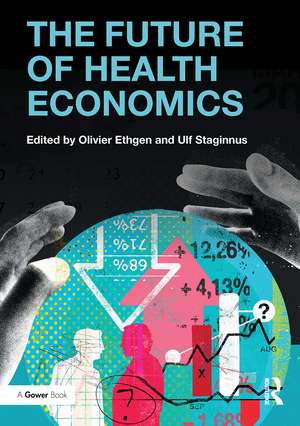The Future of Health Economics
Editat de Olivier Ethgen, Ulf Staginnusen Limba Engleză Paperback – 24 iun 2024
The Future of Health Economics offers a window into some of the most influential emerging issues in pharmacoeconomics; issues such as risk-sharing and alternative pricing models or the potential impact of radical new approaches such as personalized medicine; as well as exploring the changing role of government and regulators.
Ulf Staginnus and Olivier Ethgen, themselves two of the most well-regarded practitioners in this field, have brought together some leading-edge thinkers from industry and academia around the world to provide the industry, policy-makers, regulators, health practitioners and academics with the raw material for their future scenarios.
| Toate formatele și edițiile | Preț | Express |
|---|---|---|
| Paperback (1) | 236.20 lei 6-8 săpt. | |
| Taylor & Francis – 24 iun 2024 | 236.20 lei 6-8 săpt. | |
| Hardback (1) | 879.29 lei 6-8 săpt. | |
| Taylor & Francis – 21 oct 2016 | 879.29 lei 6-8 săpt. |
Preț: 236.20 lei
Preț vechi: 304.56 lei
-22% Nou
Puncte Express: 354
Preț estimativ în valută:
45.20€ • 47.02$ • 37.32£
45.20€ • 47.02$ • 37.32£
Carte tipărită la comandă
Livrare economică 12-26 aprilie
Preluare comenzi: 021 569.72.76
Specificații
ISBN-13: 9781032837208
ISBN-10: 1032837209
Pagini: 306
Dimensiuni: 174 x 246 mm
Greutate: 0.52 kg
Ediția:1
Editura: Taylor & Francis
Colecția Routledge
Locul publicării:Oxford, United Kingdom
ISBN-10: 1032837209
Pagini: 306
Dimensiuni: 174 x 246 mm
Greutate: 0.52 kg
Ediția:1
Editura: Taylor & Francis
Colecția Routledge
Locul publicării:Oxford, United Kingdom
Cuprins
Contents
Part I Innovation and Market Access: The role of value in market access and pricing negotiations, Ed Schoonveld; Productivity, innovation and value-based pricing, Larry Gorkin and Eugenia Gruzglin; Early optimisation of draft evidence plans for market access, Michael Wonder and Edward Hornby; An overview of market access agreements, Mondher Toumi, Julie Zard, Imene Ben Abdallah, Claudio Jommi and Joshua Cohen; Coverage of orphan drugs, Thomas Morel and Steven Simoens; Innovating in the changing market access environment, Ulf Staginnus.
Part II Technological Changes and Demographics: The increasing economic expectations of stratified and personalised medicine, Antonio Ramirez de Arellano Serna; Electronic Health Economics (eHE), Olivier Ethgen, Justine Slomian and Mel Walker; Population needs, opportunity costs and economic methods for financial sustainability in health care systems, Stephen Birch and Amiram Gafni; The fiscal impact of investments in healthcare, Mark Connolly; Does health economics have a future in Asia?, Ning Lu and Eun Young Bae.
Part III Decision-Making and Assessment: Patient preferences in health technology assessment, Janine van Til and John Bridges; Multi-criteria decision analysis, Olivier Ethgen and Kevin Marsh; Comparative effectiveness from real-world evidence, Billy Amzal, Roman Casciano, Lamiae Grimaldi-Bensouda and Lucien Abenhaim; Mathematical programming modeling to optimise allocation of healthcare interventions, Nadia Demarteau, Baudouin Standaert and Stephanie Earnshaw; Bridging health economics and capital investment modeling methods to improve portfolio management, Essè Ifèbi Hervé Akpo, Cédric Popa, Dogan Fidan and Omer Saka. Index.
Part I Innovation and Market Access: The role of value in market access and pricing negotiations, Ed Schoonveld; Productivity, innovation and value-based pricing, Larry Gorkin and Eugenia Gruzglin; Early optimisation of draft evidence plans for market access, Michael Wonder and Edward Hornby; An overview of market access agreements, Mondher Toumi, Julie Zard, Imene Ben Abdallah, Claudio Jommi and Joshua Cohen; Coverage of orphan drugs, Thomas Morel and Steven Simoens; Innovating in the changing market access environment, Ulf Staginnus.
Part II Technological Changes and Demographics: The increasing economic expectations of stratified and personalised medicine, Antonio Ramirez de Arellano Serna; Electronic Health Economics (eHE), Olivier Ethgen, Justine Slomian and Mel Walker; Population needs, opportunity costs and economic methods for financial sustainability in health care systems, Stephen Birch and Amiram Gafni; The fiscal impact of investments in healthcare, Mark Connolly; Does health economics have a future in Asia?, Ning Lu and Eun Young Bae.
Part III Decision-Making and Assessment: Patient preferences in health technology assessment, Janine van Til and John Bridges; Multi-criteria decision analysis, Olivier Ethgen and Kevin Marsh; Comparative effectiveness from real-world evidence, Billy Amzal, Roman Casciano, Lamiae Grimaldi-Bensouda and Lucien Abenhaim; Mathematical programming modeling to optimise allocation of healthcare interventions, Nadia Demarteau, Baudouin Standaert and Stephanie Earnshaw; Bridging health economics and capital investment modeling methods to improve portfolio management, Essè Ifèbi Hervé Akpo, Cédric Popa, Dogan Fidan and Omer Saka. Index.
Notă biografică
Olivier Ethgen is an Associate Professor of Health Economics at the Department of Public Health Sciences, School of Medicine, University of Liège, Belgium. He lectures in health economics (theory and applied modeling), decision sciences and pharmacoepidemiology.
Ulf Staginnus is a health economist and pharmaceutical executive with 20 years of international experience in the field of market access, pharmacoeconomics, pricing and reimbursement as well as health technology valuations within the biotechnology and pharmaceutical industry. Ulf is currently Vice President Value & Access, Region Europe with Shire in Zug, Switzerland.
Ulf Staginnus is a health economist and pharmaceutical executive with 20 years of international experience in the field of market access, pharmacoeconomics, pricing and reimbursement as well as health technology valuations within the biotechnology and pharmaceutical industry. Ulf is currently Vice President Value & Access, Region Europe with Shire in Zug, Switzerland.
Descriere
The Future of Health Economics offers a window into some of the most influential emerging issues in pharmacoeconomics; issues such as risk-sharing and alternative pricing models or the potential impact of radical new approaches such as personalized medicine; as well as exploring the changing role of government and regulators.
